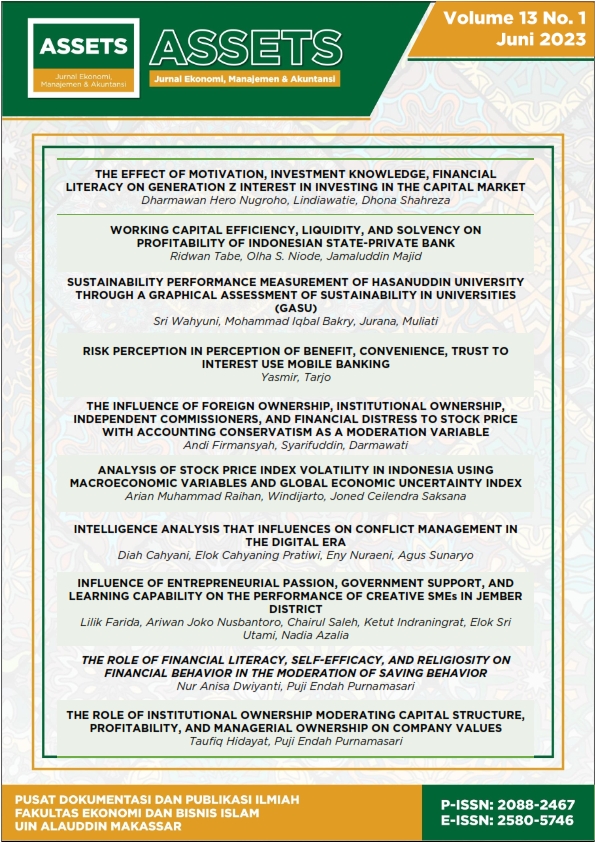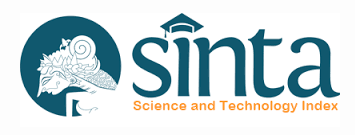THE EFFECT OF MOTIVATION, INVESTMENT KNOWLEDGE, FINANCIAL LITERACY ON GENERATION Z INTEREST IN INVESTING IN THE CAPITAL MARKET
Abstract
Investment activities in the capital market have attracted the younger generation's attention, less than 30 years old. They are Generation Z, who were born between 1995 to 2010 and 2012. This research was conducted to determine motivational factors, investment knowledge, and financial literacy on Generation Z's interest in investing in the capital market. The data collection method was distributing questionnaires to 96 respondents from Generation Z in Jakarta and analyzed using multiple regression analysis. The result is that motivational factors, investment knowledge, and financial literacy significantly and positively affect Generation Z's interest in investing in the capital market partially and simultaneously. However, the financial literacy factor has a greater influence than the investment knowledge factor. Thus the motivational factor as an internal factor will generate great interest for Generation Z in investing in the capital market if it is supported by external factors in the form of conveying investment knowledge and correct financial literacy. In addition, it will bring changes in attitudes and good financial behavior.
References
Alfarauq, AD, & Yusup, DK (2020). The Effect of Islamic Capital Market Knowledge and Investment Motivation on Garut Millennial Investment Interest in the Islamic Capital Market. Financial- Journal of Sharia Financial Management , 1 (1), 33–41. https://doi.org/10.15575/fsfm.v1i1.10052
Armstrong, M., Taylor, S. (2014). Amstrong handbook Human Resource Management Practice (13 Edition). KoganPage. www.koganpage.com
Ardani, A., & Sulindawati, NL (2021). The Influence of Investment Application Development, Investment Risk and Investment Knowledge on Interest in Capital Market Investment in Millennials and Generation Z of Bali Province in the Pandemic Era. Vocational : Accounting Research Journal | , 10 (1), 19–26. https://ejournal.undiksha.ac.id/index.php/JJAKUN/article/view/56143
Baihaqqy, M, R, IS (2020). Investment Decisions Of Investors Based On Generation Groups : A Case Study in Indonesia Stock Exchange. Coopetition : Scientific Journal of Management , XI (3), 189–196.
Belisca, A., Hidayat, M., & Syofiana. (2022). Analysis of Factors Influencing Interest in Investing in the Capital Market for the Millennial Generation. Journal Of Social Research , 1 (6), 518–534. https://doi.org/10.55324/josr.v1i6.109
Benesick, A., Csikos, G., Juhaz, T. (2016). Y and Z Generations at Workplaces. Journal of Competitiveness, 8 (3), 90–106.
Chairani, R., Bestari, MFO, & Hidayat, VS (2021). Analysis of the effect of financial literacy on investment decisions. Journal of Science, Socio Humanities , 5 (1), 691–698.
Daviano, E. (2022). Thesis The effect of financial literacy and the effect of the closest people on Gen Z participation in the Indonesian capital market . https://lib.ui.ac.id/detail?id=20519448&location=lokal
Hidayat, W., W. (2019). Basic Concepts of Investment and Capital Markets (1st ed.). Uwais Indonesian Inspiration.
Ministry of Education and Culture. (2017). National Literacy Movement, Financial Literacy Support Material (Luh Anik Mayani (ed.)). Indonesian Ministry of Education and Culture.
KSEI. (2022). Indonesian Capital Market Statistics. Indonesian Central Securities Depository Publications , 1–6. https://www.ksei.co.id/publications/demografi_investor
Lara, G., Syaipudin, U., & Widiyanti, A. (2022). Analysis of the factors that influence Generation Z's interest in investing in the capital market . 5 (1), 418–432.
Matondang, A. (2018). Influence between Interest and Motivation with Learning Achievement. Bahastra, Journal of Indonesian Language and Literature Education , 2 (2), 24–32.
OJK. (2017). Indonesian National Strategy for Financial Literacy (Revisit 2017) .
Pajar & Pustikaningsih, A. (2017). The Effect of Investment Motivation and Investment Knowledge on Investment Interest in the Capital Market in FE UNY Students. Profita Journal , 5 (1), 1–16.
Son, Y. . (2016). Theoretical Reviews : Generation Difference Theory. Among Makarti Journal of Economics and Business , 9 (18), 123–134. https://doi.org/http://dx.doi.org/10.52353/ama.v9i2.142
Putri, NMD, & Rahyuda, H. (2017). The Effect of Financial Literacy Level and Sociodemographic Factors on Individual Investment Decision Behavior. E-Journal of Economics and Business, Udayana University , 9 , 3407. https://doi.org/10.24843/eeb.2017.v06.i09.p09
Suryani, W., Tobing, F., & Emelia, Y. (2022). Factor Analysis of Investment Intention : Millennials and Gen Z perspective . 07 (01), 55–62.
Susanti, NS; Hermawan, NA; Pattihahuan, A. (2023). Advances in Technology and Understanding of Generation Z's Interest in Investing in the Capital Market. Incandescent, Management and Business Studies , 1 (2), 76–82. https://e-journal.naureendigition.com/index.php/pmb/article/view/30/20
Törőcsik, M., Szűcs, K., & Kehl, D. (2014). How generations think : Research on generation Z Krisztián Szűcs. Acta Universitatis Sapientiae, Communicatio , 1 , 23–45.
Viana, E, D; Febrianti, F; Dewi, f, R. (2021). Financial Literacy, Financial Inclusion, and Generation Z Investment Interest in Greater Jakarta. Journal of Management and Organization (JMO) , 12 (3), 252–264.
Copyright (c) 2023 Assets : Jurnal Ekonomi, Manajemen dan Akuntansi

This work is licensed under a Creative Commons Attribution-NonCommercial-ShareAlike 4.0 International License.










